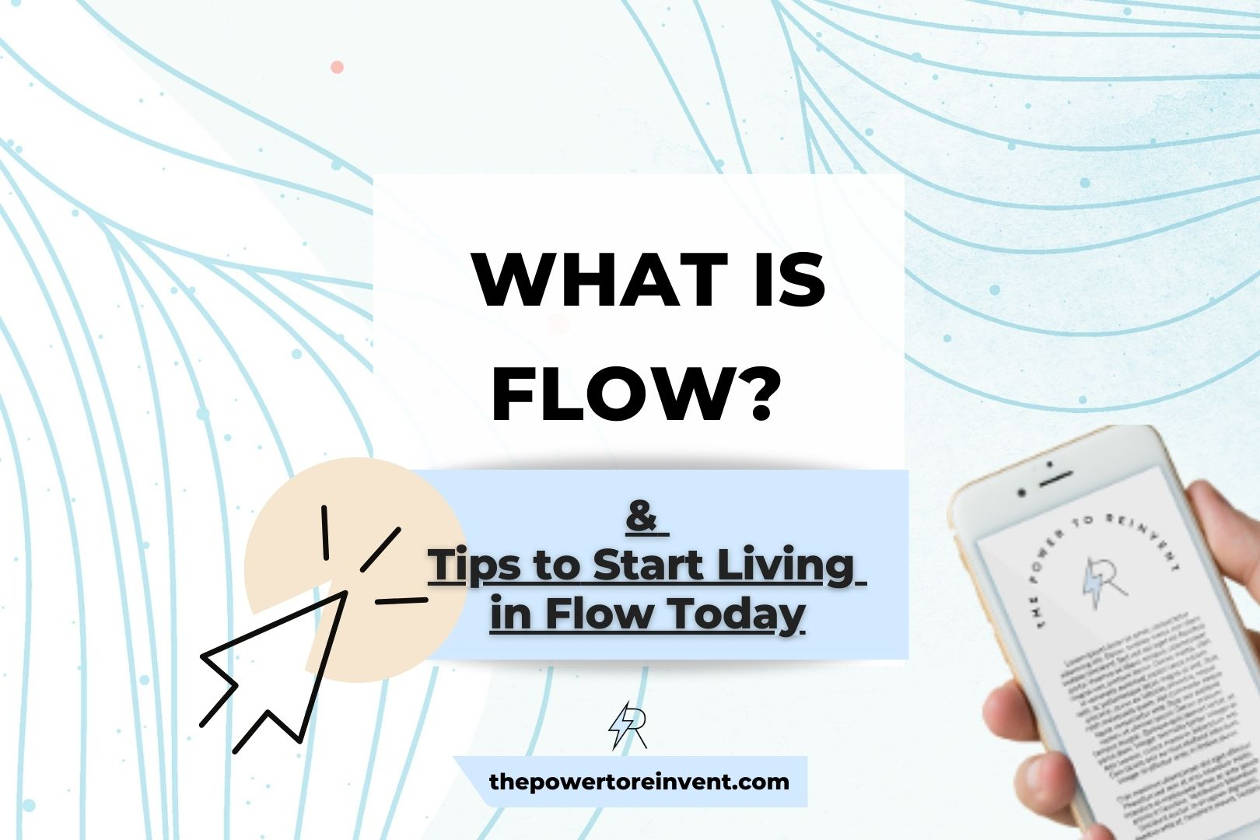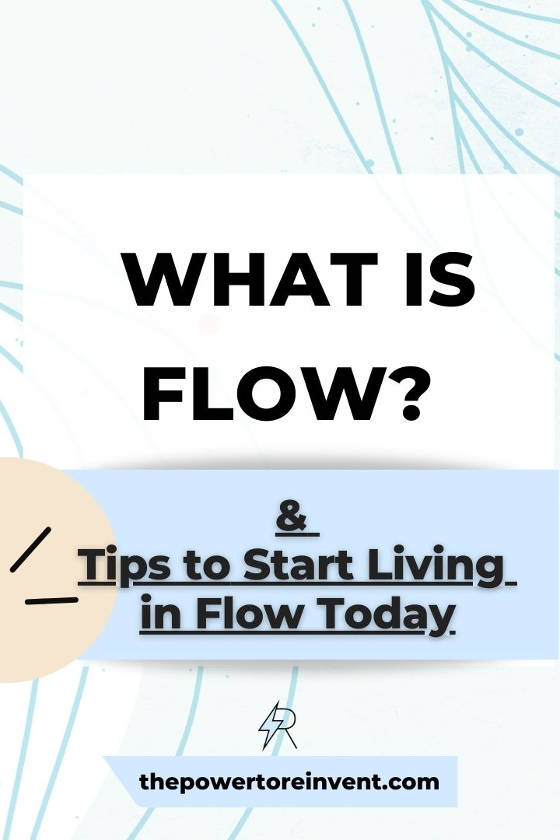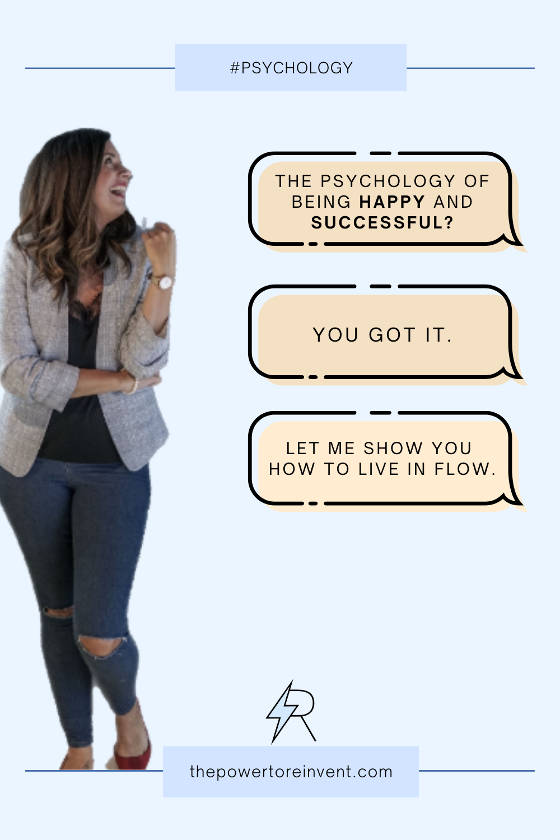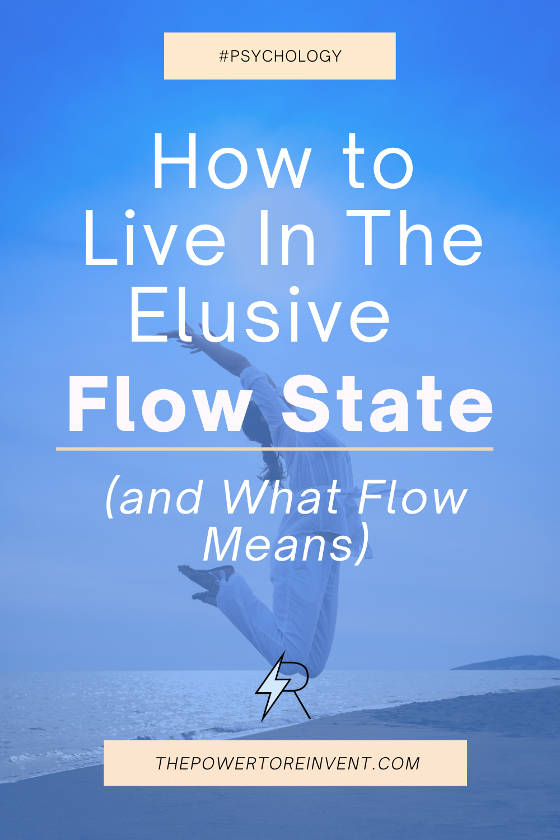Six Module Online Course to Find Your Flow . Find Out More!

Less Hustle, More Flow
Psychologists are calling on us to ditch our hustle and grind attitude and replace it with flow, hailing it as the secret to increasing happiness & productivity. But what is flow? And what are the benefits of living in flow?
In this article, we’ll walk the subject of flow psychology, show that living in flow is possible (with actionable tips), and look at why the meaning of flow can change our approach to life.
What Is Flow?
Psychologists define flow as the ‘total engagement’ with life, it is where we’re able to live life fully, without the waste of time or potential. And rather than feeling burned out from this intense engagement with life, flow creates bliss.
Indeed, psychologists and researchers have found that when we’re in flow, our productivity levels can increase by up to 500% while simultaneously increasing our levels of happiness. And yet despite its benefits, flow remains the somewhat neglected, middle child of psychology that many of us struggle to fully grasp.
A few years ago, my strategy to explain the meaning of flow was to bombard people with multiple, academic definitions and quotes. That was a mistake. Instead of leaving my audience inspired and curious for more, they were often exhausted and exasperated. Determined to find the best way to share my knowledge and understanding of flow, I arrived at what I believe is the best way. “What is Flow?” is a question best answered by you.
Take a moment to consider what the word flow means to you. Now, as you think of the flow, notice what comes to mind. Perhaps you picture ease, effortlessness, moving with the current, or being in harmony. Maybe you think of activities like painting, dancing, or picture a river moving without force towards its destination.
Interestingly, what this exercise reveals time and time again, is that intuitively we already know what flow is.
Flow is a natural state that for many of us has been drowned out by the sirens of success, striving, and stress that dominates modern life. I believe we struggle to understand it because we’ve been conditioned to believe that happiness, ease & productivity can’t all go hand in hand. And yet the psychology and science of flow repeatedly provide the evidence that they can.
A joyful life is an individual creation that cannot be copied from a recipe.
Flow state, founded by Mihaly Csikszentmihalyi in the 1970s, is where we feel our best, perform our best and fulfil our potential. And the characteristics of flow that he identified can help us recognize when we enter this beautiful state. Flow is characterized by the sensations of feeling our sense of self disappear, time distorts, we feel a sense of serenity and focus. Many people describe flow as being in the zone.
In short, flow is the moments we’re at one with ourselves and with the world around us, and nothing else matters.
But is living in flow possible?
Living in Flow – What Is Flow in Life?
The good news is living in flow is possible and the not-so-great news is flow requires focus and discipline to enter. Thankfully, living in flow doesn’t require a cult-like perfection where you ditch your phone and retreat into the wilderness. Rather, a few simple changes will bring a sense of flow and gradually edge you away from overwhelm. Let’s look at what is flow in life with my three instantly actionable tips.
#1 Notice What Elicits Flow
Flow is unique to each of us. Some find their flow starting into the cells of excel spreadsheets. While for others it comes when they feel the bright, hot spotlight hit their face as they begin to speak on stage. One person’s flow is another person’s stress – and living in flow means noticing what elicits flow for you.
Pay attention to when you feel in flow at work, working out, or with friends. Notice any patterns that emerge. What are you doing? Who are you with? What type of environment are you in? Is there a particular time of day when floe occurs?
These questions will reveal clues, not only to what elicits flow for you but also to who you are as a person. Noticing when we experience flow is the first step to living in flow.
#2 Structure Your Day Around Flow
Great. So you’ve noticed what elicits flow but what next? How do you use this information for living in flow?
In my book Find Your Flow, I write about a journal system I created that’s designed for living in flow. Part of that journal system involves intentionally structuring your day around flow by setting three high flow priorities.
High Flow Priorities are a great way of setting each day up for flow. For me, some days my high flow priorities look like writing an article, a quick 20 mins yoga, and a walk-in nature. At the weekend that might change to cooking a new recipe, going for a swim, or meeting up with friends.
Intentionally structuring our day around flow is one of the best ways for consistently living in flow. It’s also a great way to reconnect and rediscover what actually brings you joy in life.
Top Tip: Csikszentmihalyi’s flow model advises us to look at the level of challenge. If your activity is too challenging – you’ll be pushed into overwhelm. If it’s too easy then you’ll be bored. What you’re seeking is the goldilocks zone, where it’s just right.
#3 Get in Alignment with a Big Goal
Flow is much more about brief, fleeting experiences – it’s a way of life. Later in his work, Mihaly Csikszentmihalyi presented the concept of unified flow – a formula for living in flow.
He proposed that living in flow could be attained if we had a large personally compelling goal from which all smaller goals logically follow. Csikszentmihalyi continues to say that “then actions and feelings will be in harmony, and the separate parts of life will fit together—and each activity will “make sense” in the present, as well as in view of the past and of the future. In such a way, it is possible to give meaning to one’s entire life”.
One simple, practical way to implement this is to write down a large goal that will stretch you and then each day take one small action that’s in alignment with that.
Living in flow involves taking small steps, every day with purposeful intention, clearing out the non-essential so that you can regain ownership of your life. It’s about getting back to the core of who you are, what you love to do and the vision you have for your life.
Top Tip: Being in flow requires a more mindful approach to life. If you’re struggling to calm your monkey mind, check out my blog on 5 life-changing tips to become more mindful.
Meaning of Flow
The meaning of flow has the potential to transform our busy modern-day lives. It presents a very real, scientifically proven method that enables us to feel happier, more productive, and aligned with our purpose. Better yet it embraces the uniqueness of who we are as individuals and removes society’s one size fits all conformity straight jacket.
“Those who flow with the force of life, know that they need no other force”.
Perhaps in our busy, uncertain world, the meaning of flow has more importance than ever. After all, flow gives us a structure that guides us through periods of flux, protecting our mental well-being while at the same time nurturing the fulfilment of our potential.
The meaning of flow for ancient Chinese philosopher Lao Tzu is captured perfectly in his words that “those who flow with the force of life, know that they need no other force”.
Maybe it’s time we dusted off this forgotten natural state and began to give it the focus it deserves before drown in our self-created overwhelm.
What do you think? How can the meaning of flow and its application transform your life? What is flow for you? Let me know in the comments below!
Pin This Article For Later
I'm Sarah

You have the power to reinvent your life and go after your big goals. It's my job to show you how. Let's enjoy the journey together.
“Sarah’s workshop was amazing! I was totally moved by the way she presented. She is a powerhouse”
Download Free Goal Setting Template
Share this
If you've found this interesting why not share the love.



